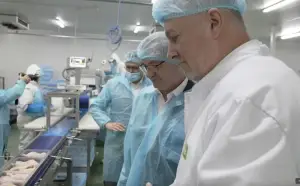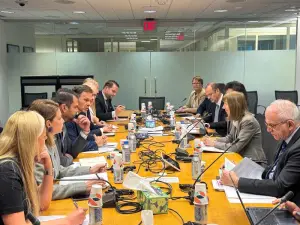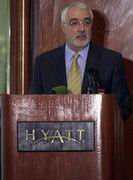- Serbia
Get to know Serbia
- Citizens
Culture and science
Health services
Pension and disability insurance
- Business
Employment
Economy
- Media
- Government
- Contact
Keep in touch
Contact form
Back
Keepin touch
Whether you have a question, comment, suggestion or any problem in the purview of the government, send us your message and we will try to respond as soon as possible. If your problem is not in our purview, we will forward your message to the relevant institution.
Q:
A:
Serbia will have a stable macroeconomic investment environment
Belgrade,
29 June 2004
Serbian Deputy Prime Minister Miroljub Labus addressed the top managers from Southeast Europe’s leading producers of consumer goods at the First International Forum on Consumer Goods Turnover, which takes place in Belgrade today and tomorrow.
Labus spoke of the investment opportunities in Serbia’s economy, as well as of the economic and political situation in the country. He said that the victory of the democratic candidate in the presidential election (Boris Tadic) is the key factor in the country’s further efforts to cooperate with the European Union and a guarantee to foreign investors that Serbia will have a stable macroeconomic investment environment.
Labus stressed that Serbia had a negative image in the eyes of the business world and investors for a long time, and was seen as a country with high investment risk. Recent events in the political life as well as the Serbian government’s first 100 days of work, had a considerable impact that this attitude of the world public is changed, he said.
He said that 2004 will be a better year in financial and economic terms for our country, adding that the social product is expected to exceed five percent. He said that exports would increase and that fiscal deficit would reduce, while the inflation should remain still. Labus also said that industrial production will exceed five percent by the end of the year if the current trend continues.
Speaking of the main advantages of investing in Serbia, the Deputy Prime Minister pointed out to the importance of Corridors 10 and 7, favourable tax system, system laws by EU standards and quality human resources, sufficient for the country to become a leader in the region with free market with around 60 million consumers.
Labus promised that the Serbian government will remove the financing obstacles and continue to build the investment climate in the country. He told the prospective investors that answers to potential confusions and difficulties are available at the Investment and Export Promotion Agency (SIEPA).
The two-day forum is organised by Adam Smith Conferences. Among the participants are Nestle, Agrocor Group, Heineken Group, Proctor&Gamble, British American Tobacco, McDonald’s, Podravka, Grand Prom and Delta Ice Cream.
Labus stressed that Serbia had a negative image in the eyes of the business world and investors for a long time, and was seen as a country with high investment risk. Recent events in the political life as well as the Serbian government’s first 100 days of work, had a considerable impact that this attitude of the world public is changed, he said.
He said that 2004 will be a better year in financial and economic terms for our country, adding that the social product is expected to exceed five percent. He said that exports would increase and that fiscal deficit would reduce, while the inflation should remain still. Labus also said that industrial production will exceed five percent by the end of the year if the current trend continues.
Speaking of the main advantages of investing in Serbia, the Deputy Prime Minister pointed out to the importance of Corridors 10 and 7, favourable tax system, system laws by EU standards and quality human resources, sufficient for the country to become a leader in the region with free market with around 60 million consumers.
Labus promised that the Serbian government will remove the financing obstacles and continue to build the investment climate in the country. He told the prospective investors that answers to potential confusions and difficulties are available at the Investment and Export Promotion Agency (SIEPA).
The two-day forum is organised by Adam Smith Conferences. Among the participants are Nestle, Agrocor Group, Heineken Group, Proctor&Gamble, British American Tobacco, McDonald’s, Podravka, Grand Prom and Delta Ice Cream.
-
 Belgrade, 27 October 2025
Belgrade, 27 October 2025Construction of Selova dam of vital importance for southeast Serbia
-
 Belgrade, 22 October 2025
Belgrade, 22 October 2025First 19 resolutions awarded under IPARD III for procurement of new tractors
-
 Šid, 21 October 2025
Šid, 21 October 2025Superior Foods example of successful Serbia-Hungary cooperation
-
 Belgrade/Washington, 17 October 2025
Belgrade/Washington, 17 October 2025Confirmation of Serbia’s position as attractive investment destination
-
 Belgrade/Washington, 16 October 2025
Belgrade/Washington, 16 October 2025Serbian economy maintains stability amid global challenges
-
 Sombor, 14 October 2025
Sombor, 14 October 2025Agriculture one of major pillars of bilateral cooperation with Italy
-
 Belgrade, 13 October 2025
Belgrade, 13 October 2025First IPARD III resolutions on support to farmers presented
-
 Belgrade, 21 September 2025
Belgrade, 21 September 2025Solution for legalisation of 4.8 million properties by year’s end
-
 Belgrade, 19 September 2025
Belgrade, 19 September 2025Strong potential for Italian investments in Serbia’s processing sector
-
 Belgrade, 17 September 2025
Belgrade, 17 September 2025Serbia committed to building strong economic ties with Russia


